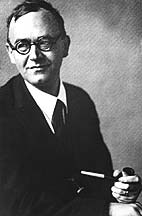
(iv.1.58.1 cont.) In this movement and declaration of reconciliation through the atonement through Jesus Christ, God does not merely “proffer” a possibility, but actually seizes us and turns us back to Him. In this movement and declaration of reconciliation through the atonement through Jesus Christ, we deal with the fulfilled covenant. In Him, the breach is healed, humanity’s being against God is altered, and  the offense and misery of humanity is removed. In Him, humanity is the faithful covenant partner and the one brought to glory by God to demonstrate His glory. In reconciliation, humanity is brought out of nothingness (being apart from the Grace of God) by the fact that God is everything, and brought into everything-ness “in his own place, on his own level and within his own limits”. In the atonement of Jesus Christ, humanity is newly created into a subject confronted by God who freely makes Himself the divine object.
the offense and misery of humanity is removed. In Him, humanity is the faithful covenant partner and the one brought to glory by God to demonstrate His glory. In reconciliation, humanity is brought out of nothingness (being apart from the Grace of God) by the fact that God is everything, and brought into everything-ness “in his own place, on his own level and within his own limits”. In the atonement of Jesus Christ, humanity is newly created into a subject confronted by God who freely makes Himself the divine object.
“In Him a new human subject was introduced, the true man beside and outside whom God does not know any other, beside and outside whom there is no other, beside and outside whom the other being of man, that old being which still continues to break the covenant, can only be a lie, an absurd self-deception, a shadow moving on the wall—the being of that man who has been long since superseded and replaced and who can only imagine that he is man, while in reality he is absolutely nothing. Yes, the atonement is the filling of this abyss of nothing, of human perdition. And it is by the abyss of divine mercy that that other abyss is filled. It is this pure divine mercy which fills the abyss, the mercy which we have to recognize and adore in this act of God, the mercy which we have to seek a fresh every morning, the mercy for which we can only ask and reach out as beggars, the mercy in relation to which we can only be recipients. By the grace of God, therefore, man is not nothing. He is God’s man.”
To be a Christian is to be God’s person, this is the truth of the reality of the reconciliation through the atoning sacrifice of Jesus Christ on the Cross. By faith the person is made new, the old has passed away; those by faith who believe will not perish but will have eternal life.
In this new reality the Christian has peace with God in all certainty. “[The] alteration in the human situation has already taken place. This being is self-contained. It does not have to be reached or created. It has already come and cannot be removed”. On this solid foundation of the new and assured being of humanity that cannot be removed, humanity operates both in rebellion and in obedience. In rebellion, humanity’s activity will conflict with their new creation, their possibility. In obedience, the activity will merely stem from the foundation on which they are placed: the new creation, possibility coming to fruition. In reconciliation, humanity is never separated from the atoning sacrifice of Jesus Christ; and it is purely in this “Other One” [Jesus Christ]—different and strange*—where we have this firm foundation on which to live, to look anywhere else would be to look to an unreality.
*Barth’s language here is reminiscent of his language in the Doctrine of Creation, specifically to the event of the creation of woman which draws man out of loneliness into relation with an other (woman) who is different and strange (yet similar) to himself (ref. CD iii.1-4, specifically: iii.1.41).

COMMENTS
3 responses to ““Wake me up inside…” (part 2c): Karl Barth’s Doctrine of Reconciliation (iv.1.58)”
Leave a Reply













L.R.E. Larkin (I was going to write "Laura" but I'm not sure that's right), I don't know if you'd be interested in this "Karl Barth Blog Conference" that's going on now on the "Faith and Theology" blog. But in case you are, there's the link….
(Sorry, that "blog conference" seems actually to be going on at another site; "Faith and Theology" just provides the links.)
bls, thanks so much and i stumbled upon that conf., too. also, it's lauren, feel free to use my first name!!